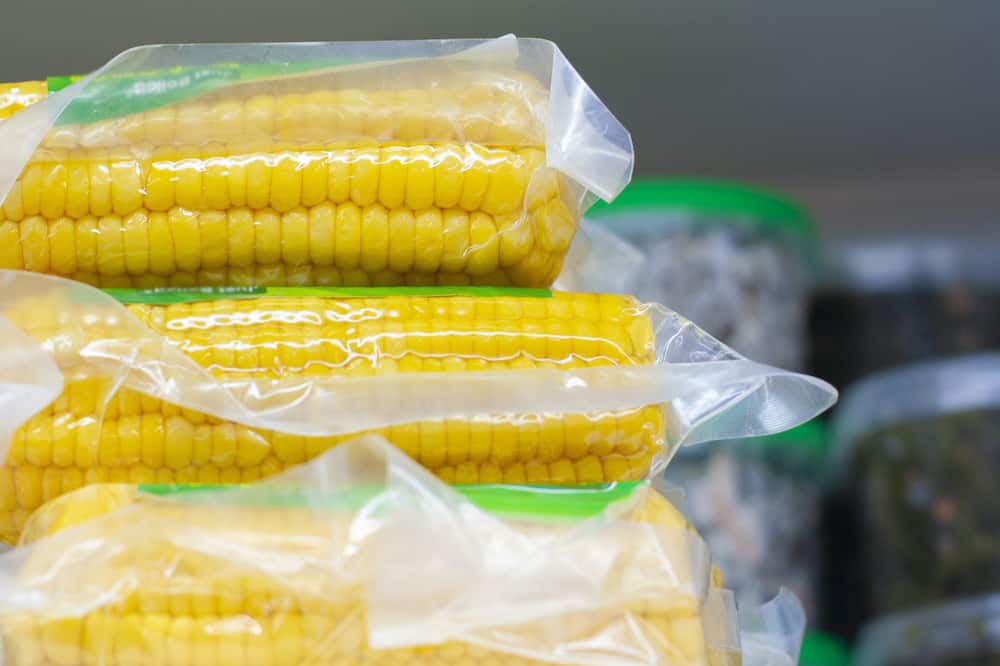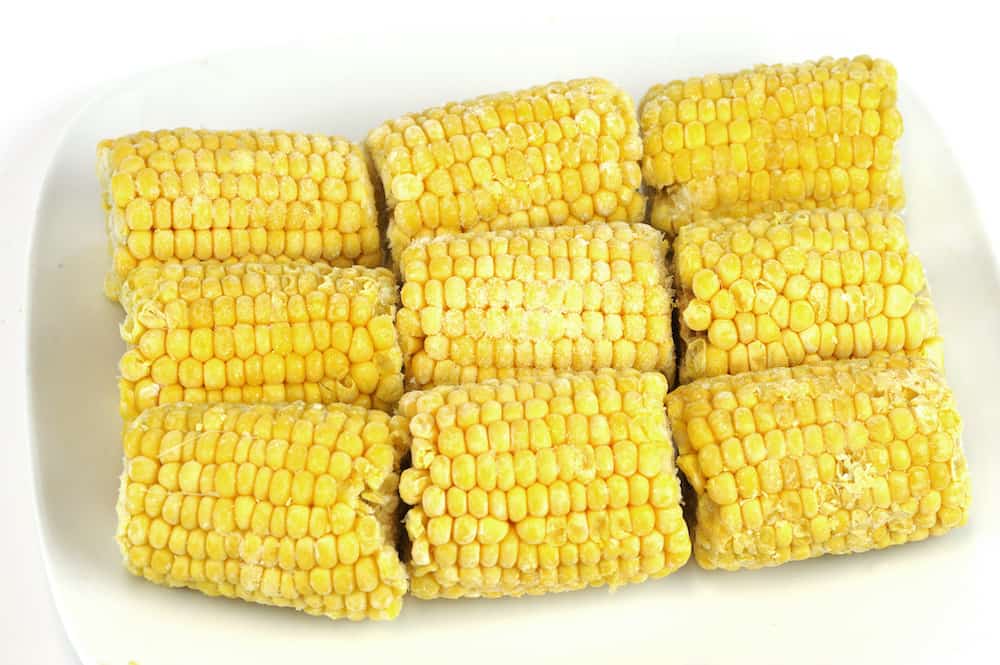If you want to enjoy fresh-tasting corn year-round or have too much to use before it spoils, freezing is a great option. Learning how to freeze corn on the cob means you can buy extra when it’s on sale or preserve your harvest when you have a large one.
However, it’s not as easy as putting the corn right into the freezer without prepping it first.
While freezing corn is a great way to preserve it, there’s an extra step that can significantly impact it – blanching. Think of it like putting on a protective layer for your corn. Blanching involves briefly boiling the corn cobs before freezing, which offers several benefits:
- Preserves freshness: Blanching inactivates enzymes that can cause the corn to lose its flavor, color, and texture during freezing. This ensures your frozen corn tastes just as good as the day you picked it.
- Maintains crispness: Unblanched corn can become tough and chewy when frozen. Blanching helps keep the kernels crisp and tender.
- Retains nutrients: Blanching minimizes the loss of vitamins and minerals that can occur during the freezing process.
So, is blanching necessary? It’s not essential, but it will result in the best-tasting and quality corn when you’re ready to use it.
Keep reading to learn the different ways:
- Freeze blanched corn on the cob: Involves blanching the cobs before freezing; results in crisp, flavorful corn that retains its freshness well
- Freeze unblanched corn on the cob: Quickest and simplest, but the corn may lose some texture and flavor compared to blanched corn
- Freeze fresh corn kernels: Involves cutting the kernels off the cob before freezing; makes them easy to add to dishes without thawing the entire cob; can blanch the kernels before freezing or freeze them raw
How to Freeze Corn on the Cob
Here’s what to know about the three most popular methods for freezing corn on the cob. BE SURE TO DRY THE CORN completely before freezing.
Freeze Blanched Corn on the Cob
- Pros: Results in crisp, flavorful corn that retains its freshness well
- Cons: Takes the most time and effort
How to Blanch Corn for Freezing
- Bring a large pot of water to a rolling boil. Use around one gallon of water per pound of corn.
- Shuck the corn; remove the silk.
- Blanch the cobs for:
- Small ears (1.25 inches in diameter): 7 minutes
- Medium ears (up to 1.5 inches in diameter): 9 minutes
- Large ears (1.5+ inches in diameter): 11 minutes
- Immediately transfer the corn to a bowl of ice water to stop the cooking process. This helps preserve the taste and texture.
- Drain the corn and pat it dry.
- Put in airtight freezer bags, removing as much air as possible.
- Label with date, and freeze for up to 1 year.
Freeze Unblanched Corn on the Cob
- Pros: Quickest and simplest method.
- Cons: Corn may lose some texture and flavor compared to blanched corn.
Following this corn freezing method doesn’t make the corn as easy to use for recipes where the kernels need to be cut. Also, you might find that when cooked, the corn might be a little too watery and chewy for your liking.
However, by far, freezing unblanched corn on the cob is the easiest and least time-consuming option.
How to Freeze Corn Cobs Without Blanching
- Shuck the corn and remove any silk.
- Place the cobs in freezer bags, removing as much air as possible.
- Label with date, and freeze for up to 6 months.
Freezing Fresh Corn Kernels
- Pros: Makes kernels easy to add to dishes without thawing the entire cob; can be blanched or frozen raw.
- Cons: More prep work than freezing cobs whole.
How to Freeze Fresh Corn Kernels
Blanched kernels:
- Follow steps 1 – 4 from the “Freeze Blanched Corn on the Cob” method, but blanch the kernels for 4 minutes instead of the cobs.
- Drain the kernels in a strainer and pat them dry.
- Package the kernels in airtight freezer bags, removing as much air as possible.
- Date bag with Sharpie, and freeze for up to 1 year.
Raw kernels:
- Shuck the corn, removing the silk.
- Cut the kernels off the cob.
- Package the kernels in airtight freezer bags, removing as much air as possible.
- Label with date, and freeze for up to 8 months.
How Long Can You Freeze Corn on the Cob?
With proper preparation, you can easily keep corn on the cob frozen for an extended period. Although freezing isn’t forever, corn is one of the hardier vegetables to keep for up to a year.
On average, frozen corn on the cob should be used within 8 – 12 months of the initial freezing date.
Be sure you write the date on your packages before putting them into the freezer so that you can keep track. This way, you can quickly cycle through the corn, eating the “oldest” first, and ensure you aren’t eating any past their expiry date.
According to the University of Minnesota, frozen corn will last the longest when frozen at zero degrees or less. It’s crucial to maintain a constant freezer temperature to ensure the longevity and quality of the frozen corn.
It’s also a great idea to consider some top tips for storing food long term, especially if you want to preserve cooked corn, such as vacuum sealing to minimize air exposure and prevent freezer burn.
How to Shuck Corn Easily
- Twist and pull: Hold the stem and twist the husk down while pulling it off. The silk should come too.
- Brush it off: Use a soft brush (like a toothbrush) to remove any leftover silk. You can also use a dry paper towel.
- Stuck husk? Soak the cob in cool water for a few minutes to loosen it.
What to Freeze Corn In
Use gallon-size, plastic zip-lock freezer bags. Using freezer bags will help prevent freezer burn. Be sure to remove as much air as possible before sealing.
Many people choose to use airtight containers, but freezer bags save more space.
Be sure to store the corn in the back or bottom of the freezer, keeping it off the door. This will protect it from temperature fluctuations from opening the freezer. This will lessen the chance of freezer burn.

FAQs about Freezing Corn on the Cob
1. Do you have to blanch corn on the cob before freezing?
No, you don’t have to blanch corn on the cob before freezing. You can quickly freeze corn unblanched or still in its husk if you want to save valuable prep time.
However, there are benefits to blanching it. It can make cooking it slightly easier. You’ll also find that blanched corn provides a completely different taste and texture that you’re likely to enjoy more.
By blanching beforehand, all you’ll have to do is defrost the corn and add it to your recipe. This process makes it ideal for cold snacks and meals, such as salads and salsa.
2. Can corn on the cob be frozen with husks?
If you want to reduce your prep work, you should ask, can corn on the cob be frozen with husks? All you will have to do is wrap the corn in a saran wrap the corn while in its husk and put it into an airtight freezer bag.
Using a permanent marker, make sure you write the date on the corn before freezing. Once the date has been indicated, you can keep the corn frozen until needed, but it will need to be cooked once taken out.
3. How do you freeze corn without blanching it?
Freezing sweet corn without blanching is much simpler than you’d expect, especially as you won’t have to boil it beforehand. The most important part of the process is to make sure it’s in an airtight bag to prevent freezer burn.
Plenty of people also like to wrap their cobs in saran wrap before putting them into a freezer bag for extra protection.
4. How long do you blanch before freezing corn on the cob?
If you want to blanch your corn on the cob before freezing it, you’ll want to follow some guidelines. We’ve summarized the National Center for Home Food Preservation’s outline for blanching corn on the cob based on size.
- Small ears (1.25 inches in diameter): blanch for 7 minutes
- Medium ears (up to 1.5 inches in diameter): blanch for 9 minutes
- Large ears (over 1.5+ inches in diameter): blanch for 11 minutes
If you’re blanching your corn kernels before freezing, the guidelines are slightly different from cobs. It’s best if you blanch your kernels for 4 minutes before packing them for the freezer.
5. Is frozen corn good for you?
Frozen corn is a popular choice for its convenience, affordability, and for its nutrients. It’s loaded with fiber, keeping you feeling fuller for longer. However, compared to some other veggies, corn packs a bit more sugar. While corn itself isn’t unhealthy, how you cook it makes a big difference.
How to Freeze Corn on the Cob
Learning how to freeze corn on the cob is straightforward and very versatile. Whether you prefer it blanched, unblanched, in cob form, or kernels, you have options for storing it in the freezer.
Follow these steps to ensure the proper preparation to maintain the high nutritional value of your corn and to avoid freezer burn. Freezing fresh foods is a way to have fresh foods on hand for when you need them.

